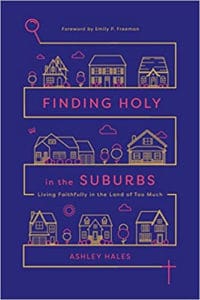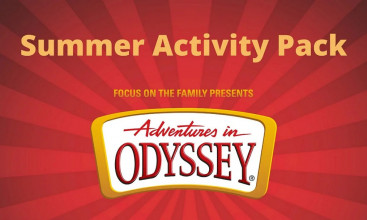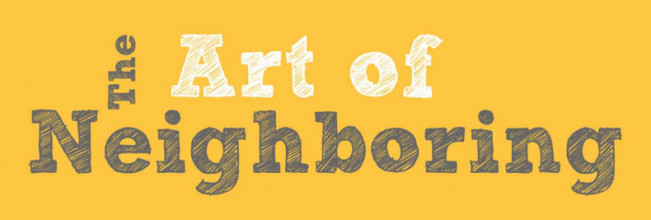
The War of Words
In this Adventures in Odyssey drama, a carelessly uttered word from Eugene creates havoc as it becomes the fashionable insult, resulting in a lesson about the power of words.
Home » Episodes » Focus on the Family Broadcast » Overcoming Suburban Idolatry to Reach Others
Excerpt:
Dr. Ashley Hales: I think a lot of it is to – to even just ask ourselves, you know, how is it working out for you? You know, this busy life where you are just in and out and you’re eating take out in the car. And, you know, are you feeling like this abundant life that Jesus promised to us? Probably not, you know. And in – we’re not probably really loving God and loving our neighbor.
End of Excerpt
John Fuller: Ashley Hales joins us today on Focus on the Family and your host is Focus president and author Jim Daly. Thanks for joining us. I’m John Fuller.
Jim Daly: John, you have to remember those great stories of missionaries who traveled overseas to share the gospel. I remember sitting and hearing Elizabeth Elliott…
John: Hmm.
Jim: …at KC 83.
John: Oh, my word.
Jim: If you can believe that. It was a big, like, college gathering.
John: Yeah.
Jim: And tens of thousands of people were there, and Elizabeth Elliot spoke. It was riveting to hear about her husband, the other men that died, and how they then came back and won the hearts of those tribesmen and many became Christian. And then you have, uh, Hudson Taylor…
Jim: …Who witnessed in China and really brought the gospel into China. It’s amazing to think of those big, almost like glamorous, Christian endeavors, right? You think of it in such grandiose ways. And I’m sure they were thinking, “We’re just doing what the Lord’s called us to do.”
John: Mm hmm.
Jim: Today there are many impoverished areas around the world that need the gospel, and we’re so grateful that missionaries are going, but Christians often forget what’s happening, sometimes desperately what’s happening, right in their own neighborhoods, right?
John: Mm hmm.
Jim: Right here in America. And the idea of poverty and the downtrodden, those that are not doing well. And what can we do to, um, bring the gospel to them? It’s convicting to think about that. Today’s guests, we’re going to talk about the city, the suburbs, and what our attitude should be in this environment.
John: Yeah. Ashley Hales is with us, as I mentioned. She’s a writer and a speaker and a pastor’s wife. And, uh, she’s written a book called Finding Holy in the Suburbs. We’ve got that, of course, at focusonthefamily.com/broadcast. Or give us a call and we’ll tell you more.
Jim: Ashley, welcome to Focus on the Family.
Ashley: Oh, it’s such a pleasure to be with you.
Jim: OK. I’m already intimidated. You have a PhD in English…
Ashley: I do.
Jim: …From Edinburgh.
Ashley: Yes.
Jim: From the University of Scotland, right?
Ashley: Yep. Yep.
Jim: Wow.
Ashley: Yeah.
Jim: I mean, how – why did you do that?
(LAUGHTER)
Ashley: Well, my husband and I were young and newly married, and it sounded super adventurous and amazing. So, we both – he went off to do his seminary degree and I went and started my PhD.
Jim: Can I just ask a question? When you hear us talking, like John and I, do you say, “Oh, that’s a dangling participle”?
Ashley: No.
John: (Laughter).
Jim: You don’t?
Ashley: It’s OK. No.
(LAUGHTER)
Jim: It’s good because…
John: Thank you.
Jim: …I’m not even sure what a dangling participle is. I’ve heard it mentioned a couple times.
Ashley: It’s the one at the end.
(LAUGHTER)
Jim: It’s the one at the end. And, again, what’s a participle? I was in public school for a long time.
Ashley: It’s fine.
Jim: It is great to have you here.
Ashley: Thank you.
Jim: And, uh, you and your husband were in Scotland. First of all…
Ashley: Right.
Jim: …What was that like living overseas?
Ashley: It was such an adventure. Um, it was great ’cause we were poor graduate students, and yet, because things – you can find a great student deals so we can travel. We were with a bunch of people from all over the world that came to study in Scotland. Um, and so, it felt like this really vibrant community. Very cosmopolitan. We kind of felt like we were poised on, you know, the brink of something. You know, what it is God going to do with us and our education? And look, now we’re overseas. We’re primed and ready to do big things for the gospel. And then we went back home. (Laughter)
Jim: Interesting. Kind of what I was saying in the setup.
John: Hmm.
Jim: This idea of Hudson Taylor and Elizabeth…
Ashley: Yeah. Right.
Jim: …And Jim Elliott and their adventures into these lands of intrigue.
Ashley: Yep.
Jim: But – and you were thinking maybe it would be something like that.
Ashley: Right. Yeah. Or even, you know, we were working with a small church, a Scotland Parish, there and maybe we would plant church there and, you know, do cross-cultural ministry and all these sorts of things. Or at least, you know, go take this experience back to the U.S. and, you know, work in an inner city or something.
Jim: So, you come back to the U.S. Where did you settle? In Salt Lake City?
Ashley: No, we ended up first in Pasadena, California. Um, and then we were in a year in San Diego. And my husband did – when the housing market crashed, we moved to Salt Lake City, um, because people weren’t really planting churches and giving bunches of money towards planting churches at that point. Um, and my husband did campus ministry for six years at the University of Utah. And then after that, we moved back home to Orange County, California.
Jim: Now and this is where we pick it up. And this wonderful book that you’ve written, Finding Holy in the Suburbs: Living Faithfully in the Land of Too Much. So, this is as the moment it started to evolve for you…
Ashley: Yep.
Jim: …Because you had a lot of city living.
Ashley: Yep.
Jim: And then you move out into the suburbs. Why did that strike you? Why did that catch your attention? Um, why was it different?
Ashley: Yeah. I think all of our places really tell stories and a lot of city urban places we can tend, especially as Christians, to say, “OK. I’m going to really live this kind of very full-orbed gospel life, where I’m, you know, working with people in poverty.” Or “I’m working with justice initiatives.” Or, you know, “I’m working to help create really great high profile dialogs amongst the elite.” Um, and so, we have a sense of how we operate as Christians in the city. And a lot of that really is come in the last like 20 years. Before that, the city wasn’t really a focus of, kind of, Christian ministry and mission. And yet suburbia often can tell us the story that we have the ability to withdraw from these issues. And so, the question I found as I moved back to suburbia was, you know, how can I live out the gospel story here in a way that makes sense for this place and yet moves me not away from people, but towards interacting, towards loving my neighbors, towards loving God?
Jim: You mentioned in the book – I think a fair way to say it is kind of your alert went on…
Ashley: Yeah.
Jim: …About living in idolatry.
Ashley: Mm hmm.
Jim: And I really want to dig into that because I think, you know, 50 percent…
Ashley: Right. Mm hmm. Yeah
Jim: …I believe your book stated that about 50 percent of people live in the suburbs.
Ashley: Yep.
Jim: That’s half of us.
Ashley: Right. (Laughter)
Jim: I’m no English PhD, but I can figure that one out.
(LAUGHTER)
Jim: Um, but, you know, with that, it does feel comfortable.
Ashley: Right.
Jim: It’s kind of a retreat.
Ashley: Yep.
Jim: You pull out of the messiness of the city.
Ashley: Mm hmm. Right.
Jim: If you work in LA…
Ashley: Right.
Jim: …It would be a great example.
Ashley: Yep.
Jim: And you drive 60 miles…
Ashley: Mm hmm.
Jim: …To get to your house…
Ashley: Mm hmm.
Jim: …Four hours later.
Ashley: Right.
(LAUGHTER)
Jim: You arrive home.
Ashley: Yep.
Jim: So, you pay a price for that.
Ashley: Yeah.
Jim: But it – there it isn’t like a – a decompression of that.
Ashley: Mm hmm.
Jim: And is that wrong? Is it bad…?
Ashley: Mm hmm.
Jim: …Or what – what is your conclusion there?
Ashley: Mm hmm.
Jim: And connect that all to the idolatry issue.
Ashley: Right. You know, I think a lot of it – it’s not to say that things like safety or having money are bad things, um, but anything that we hold up as something ultimate can easily become an idol. You know, if – if this is where we find our identity, if this is where we find our ultimate satisfaction, you know, if it’s because I live in a safe neighborhood, I feel safe instead of I feel safe because I am in the story of Jesus moment by moment, then that’s an idol. And so, I think what’s hard is suburban idols. You know, they don’t look as flashy as maybe, you know, someone earning a ton of money or fame or power or all of these things that we can easily kind of deduce in other people, you know, on a – on a TV screen. Um, but to be able to pay attention to the ways in which our own hearts are so prone to idolatry as well.
Jim: Help me with examples of suburban idolatry.
Ashley: Yes. So, I think a lot of them really tell us the story that the good life is found in centering myself. Right? This kind of narrative of American individualism. Which we know we – we believe, right, as Americans, as Christians, that freedom is important. And yet, when we kind of take that to the nth degree, what ends up happening is that all – we care about our own personal freedoms and we don’t actually care about, you know, the freedom of other people. Or we end up buying in order to feel loved and valued. Consumerism is a huge issue. And so…
Jim: OK. But we got to press you on the Target…
Ashley: Yeah. Yeah. Yeah.
Jim: One.
Ashley: Yeah. Targets.
Jim: Because you really confess your consumerism.
Ashley: Yes. I open the book with a story about Target.
(LAUGHTER)
Jim: So, let – let’s hear it.
Ashley: You know, I think – what I think I realize is it’s easy to say, “Well, I’m not like all of those other suburban moms.” Right? “They go to Target all the time. And I just go once a week or something. So, it’s really not a problem for me.”
Jim: It’s a necessity.
Ashley: Right. I have to. I have to feed my family.
Jim: (Laughter).
Ashley: Um, but while I’m there, I’m also going to do – go through the sale racks, you know. And there’s a sense in which even we start going down the aisles of Target, for instance, and saying, “OK, if I buy this water bottle, then I’ll be healthy.” You know, this is kind of the story in our heads. Or “If I buy these cute shoes.” Or “If I buy these crafts, then I’m going to become this, like, really amazing, crafty mom.” Right? And we’re using all of the things that we purchase to try to make us into something that we value.
Jim: Is some of that OK, though?
Ashley: Oh, yeah.
Jim: I mean, I’m trying to…
Ashley: Right. Yeah.
Jim: Find that balance because I, you know…
Ashley: Right. I think I just think most of us are so unaware that that’s what we’re doing when we go to someplace like Target.
Jim: So, what does that awareness lead you to?
Ashley: Yeah.
Jim: So, if you’re feeling like – and I think in the book, the opening…
Ashley: Yep.
Jim: …Of that story – I thought the great connection there that you mentioned is it became an idol for you…
Ashley: Right.
Jim: …Became a crutch. It became, uh – almost like you were medicating…
Ashley: Right.
Jim: …Through shopping.
John: Hmm.
Ashley: Right.
Jim: Now, I hate shopping….
(LAUGHTER)
Jim: …So I don’t understand what you’re doing there.
Ashley Right.
Jim: But – but help me understand why that was bringing you comfort.
Ashley: Right. Well, I think there’s a sense, right, in just our normal lives, right? Where we get overwhelmed. We feel depressed or we feel anxious. We just feel stressed out. We – we don’t know what to do with ourselves. All my children went off to school and I was like, “I have all this free time. I’m just going to wander the aisles of Target. Why not?” Um, and so, I think what we’re end up doing when we’re doing that is, we’re like – we’re looking for something to, like, bring us more alive.
John: Mm hmm.
Ashley: And we’re maybe a little bit scared of going to the Bible, of praying some of those desires to God. That feels a little scary. We don’t really know why we’re feeling angsty. There’s nothing really that might point to that. And so, it’s just easier to say, “I’m going to go get my coffee and I’m going to go shopping.”
John: So, it’s not that you’re constructing this idol that you’re going to worship at.
Ashley: Right. Yeah.
John: It’s more that you’re finding satisfaction and fulfillment where God should be providing that…
Ashley: Right.
John: …In something else.
Ashley: Right.
Jim: You know, we often, though, think of these things in very, uh, solid constructs…
Ashley: Mm hmm.
Jim: …Like where’s that line?
Ashley: Mm hmm. Mm hmm.
John: Hmm.
Jim: You know, if you’re in a black and white thinker, you’re going, “OK. How do I stay below the line…”
Ashley: Right.
Jim: “…Of I – idolatry?”
Ashley: Right.
Jim: ‘Cause as a Christian, I don’t want to – I don’t want to…
Ashley: Right.
Jim: …Be an idolater.
Ashely: Yes.
Jim: So, when is this much OK…
John: Hmm.
Jim: …And that much is not OK?
Ashley: Mm hmm. Right.
John: Oh, yeah.
Jim: How do you determine that?
Ashley: A lot of time in prayer, right? But I think so – you know, we want to be just right. Just underneath that line. Um…
Jim: I don’t want to feel guilty…
Ashley Right.
Jim: …Every time I have to go shopping.
Ashley: Right. Right. And to say we want to be able to buy things that are beautiful, to bless people. You know, we want to create. You know, surprise your children with a gift or something. So, it’s not to say that purchasing is – is bad. But I think just to even ask ourselves a question. What is underneath…
Jim: Right.
Ashley: …This purchase.
Jim: And that’s a healthy thing.
Ashley: Yes.
Jim: What’s motivating me?
Ashley: Mm hmm.
Jim: Why am I doing this?
Ashley: Mm hmm.
Jim: Those are always good questions, right? Um, let’s move to the other – well, there are many aspects of the book.
Ashley: Yeah.
Jim: But safety was another one.
Ashley: Yeah.
Jim: This is hilarious because…
Ashley: (Laughter).
Jim: …I think men, dads…
Ashley: Uh huh.
Jim: …And moms will relate differently on this one.
(LAUGHTER)
Ashley: Yeah. Yeah.
Jim: And Jean and I, if we had an issue in our parenting early on…
Ashley: Mm hmm. Yeah. Mm hmm.
Jim: …When the boys were learning to ride bicycles…
Ashley: Right.
John: (Laughter).
Jim: …And going to the park. It was bubble-wrap-mom.
Ashley: Yep.
Jim: And punch-the-bubbles-dad.
Ashley: (Laughter) Right. Yeah.
Jim: You know, “What are we doing?”
Ashley: Right.
Jim: “Where are their helmets?”
Ashley: Right.
Jim: Well, that’s always smart.
Ashley: (Laughter) Right.
Jim: It’s learn to let your kid right and make your kids wear bike helmets.
Ashley: Yeah.
Jim: When they’re riding bikes.
Ashley: Yep.
Jim: Sometimes I was a little relaxed about that.
Ashley: Yep.
Jim: But speak to the safety issue. And again, where that line is, where, you know, we don’t want to be over-safe with our kids…
Ashley: Right.
Jim: …Because we’ll – we’ll shape them in such a way that they’re fearful.
Ashley: Right. Right. You know, what’s really fascinating is that a lot of children who tend to grow up in suburban contexts that tend to be a little bit more affluent and safe. We have this this combination now of kind of over-involved helicopter parenting that’s going on…
Jim: Yes.
Ashley: …Plus like the resources to be able to do something with it. That’s actually me – making suburban kids more at risk for suicide and mental health problems than children in poverty.
Jim: And that’s so sad. I mean, that is unhealthy.
Ashley: It’s horrible. Yes.
Jim: Let me ask you, just before we move on…
Ashley: Yeah.
Jim: Because some parents might be in that spot.
Ashley: Right.
Jim: They’re concerned about their children. What can you do to unwind that, to allow…?
John: Mm hmm.
Ashley: Mm hmm. Mm hmm. Mm hmm.
Jim: …Some of that pressure to offer your children? What are things that you can do?
Ashley: Mm hmm. That’s great. You know, I think obviously, if you’re needing counseling or mental health help, do not be afraid to go and seek that out. Um, for us as parents, you know, I’m even realizing it’s really helpful to speak to a counselor myself and go through my own issues so that I’m not putting that on my children. Um, but to create safe spaces for them, you know, to continue to affirm that you love them, that their choices are not the define – they don’t need to earn your love, um, I think are just some of those really important messages to create a place of good safety, but not in the safety in a sense that I’m going to protect you from harm.
Jim: Yeah.
Ashley: Because we can’t protect our children from harm. Ultimately, we have to release them into the loving care of Jesus and know that He will direct their story.
Jim: Well, I think, you know, it’s – it’s great advice and that’s one of the reasons, the biggest reason, we have counselors here at Focus.
Ashley: Yep. Mm hmm.
Jim: So, people can call and get help.
Ashley: Yep.
Jim: And it starts that process…
Ashley: Yep.
Jim: …Especially if you have some reservation about taking that first step…
Ashley: Mm hmm.
Jim: …but doing that over the phone, is a great way to start.
Ashley: Mm hmm.
Jim: Our counselors are wonderful. Geremy Keeton, who heads up the counseling team, does a fantastic job.
John: And, uh, some really great insights today from Ashley Hales. She’s our guest on Focus on the Family. And we do want to commend her book, Finding Holy in the Suburbs. Stop by our website to get a copy and, uh, find other resources to help you as a mom or a dad. That site is focusonthefamily.com/broadcast. Or call 800, the letter A and the word FAMILY.
Jim: You know, Ashley, as we’ve come out of this pandemic thing…
Ashley: Mm hmm.
Jim: …And you know, we had time sheltered-in-place.
Ashley: Yep.
Jim: Um, everybody kind of slowed down and some of that was really helpful. It was positive, even though it was in a negative context, right?
Ashley: Right.
Jim: And it did help me to reflect on what’s important…
Ashley: Mm hmm.
Jim: …What to concentrate on.
Ashley: Mm hmm.
Jim: But as we begin to unleash the schedules again…
Ashley: Mm hmm.
Jim: …Things are getting back to some kind of normal.
Ashley: Right.
Jim Um, I’m reminded of another idol that you talk about for this suburban life, which is this busyness thing…
Ashley: Mm hmm.
Jim: …That we mark ourselves and measure ourselves in busyness. Speak to that.
Ashley: Yeah, I think, you know, the busy idol, you know, if you ask anyone, “Hey, how are you doing?” It’s either “I’m fine” or “I’m busy.” Right? And now…
Jim: And I got to do this. I got to do that.
Ashley: Right. Right. And so…
Jim: You want to hear more?
(LAUGHTER)
Ashley: Right. Yeah. And the thing with busyness, right, is that we use it to basically say “I’m worthwhile. I’m valuable.” Because I’m so important that I have to be running around, even if we’re manufacturing some of this running around. And just realizing we don’t have to live a busy life. And often the things that, you know, Jesus talks about in His parables are small things. Yeast, nets, you know, the pearl of great price. They’re – they’re small things. The kingdom is like a little seed, right? That mustard seed. And so, I think for us to be even to be able to pay attention to small things, we have to be able to slow down a little bit.
John: Hmm.
Jim: But that can be difficult. In your book, you mention becoming the mommy chauffeur.
Ashley: Yes.
Jim: I mean and taking the kids to I don’t know how many different…
Ashley: Right.
Jim: …Soccer practices.
Ashley: Right. Yeah.
Jim: But what’s the practical way to not be overly committed?
Ashley: Right.
Jim: When you have three or four kids saying, “I want to do this”?
Ashley: Right. Right. I think, you know, we’ve tried to tell our children, “OK, you can have one extracurricular activity per season.” But even that with four kids is…
Jim: Is a lot.
Ashley: …I mean, is still too much. Um, we’ve had to enlist the grandparents. Um, and so, a lot of it, I think, is for me to realize my children or my goal as my – as a parent is not to make them happy or give them every possible opportunity. (Laughter) It’s really to help them learn and to belong to a family, um, so that they can belong to the family of God. And so, choosing to say, you know, “Maybe you’re not going to be on that travel soccer team because, you know, you won’t be able to go to church.” Or “We’re going to – we don’t want the whole family to revolve around you, um, but you can still play soccer.” Is maybe one kind of countercultural in today’s environment, you know, of youth sports culture that can help us slow down.
John: Hmm.
Jim: It’s so true. I mean, I have friends that their children are in travel club sports teams.
Ashley: Right. Yep.
Jim: And I’m so thankful Trent and Troy didn’t go that direction.
John: (Laughter) Yes.
Ashley: Mm hmm.
Jim: You know, I didn’t pressure them either way.
Ashley: Yeah.
Jim: But when I talk to them, they’re exhausted…
Ashley: Mm hmm. It is. Yeah.
Jim: …And they’re spending thousands of dollars.
Ashley: Exactly.
Jim: You know, to travel across the country…
Ashley: Yeah. Yeah.
Jim: …To play baseball game.
Ashley: Right.
Jim: And you’re going, wow.
John: I had a friend whose son did that in baseball…
Ashley: Yep.
John: …And they were quite hopeful that he would go into baseball.
Ashley: Right Yep.
John: And he’s not doing sports anymore.
Ashley: Right. Yeah.
John: It was a – it was a hobby at the time…
Ashley: Right.
Jim: Right.
John: …But it wasn’t a passion for life.
Jim: And, you know, you want to pursue those dreams and those goals.
Ashley: Right. Yes.
Jim: And it’s, again, back to that idea of what’s appropriate, what’s not?
Ashley: Right.
Jim: So, there’s no easy answer now that at all.
Ashley: No. There’s not.
Jim: Let’s move into some deeper issues related to suburban life.
Ashley: Yep.
Jim: You use words like sin and repentance. And, of course, those things make us a little uncomfortable as Christians.
Ashley: (Laughter) Yeah. Right.
Jim: We don’t want to be there. Describe what true repentance is and why is it important to acknowledge the different ways we chase that fulfillment…
Ashley: Mm hmm. Mm hmm.
Jim: …That we were talking about.
Ashley: You know, I think even as we slow down, as we practice, you know, paying attention to our places. As we pay attention to, kind of, the lives of our families and our churches and our neighborhoods, we pray. You know, the Spirit of God is going to show us, oh, gosh, you are going to Target to fulfill this deeper longing. And – and you don’t feel content. You know, you’re only as happy as the next purchase or the next thing on your calendar, even just with this pandemic in the sense that we kind of felt really stir crazy. We don’t know what to do with ourselves when we’re – when we have our world kind of changed upside down. And what are the anchoring things that are going to increase to the story of the gospel. And so, I think Jesus invites us into repentance to re-anchor us into His story in saying that, you know, “Actually your deepest identity is as a beloved child of God.” And you can only really get there through the doorway of repentance and seeing how Jesus not only forgives our sin but gives us His perfection, um, on our behalf.
Jim: One of the things that caught my attention in your book that I think is maybe the core thing…
Ashley: Mm hmm.
Jim: …Is that living in the suburbs, it allows you to hide.
Ashley: Yeah.
Jim: You can, you know, put your garage door up.
Ashley: Yep.
Jim: You go in.
Ashley: Yep.
Jim: You, you know, interact with your family.
Ashley: Yep. Yep.
Jim: And the next morning, you put that door up again…
Ashley: Yep. Yep.
Jim: …And you drive out. You wave and yard right to some of the neighbors, but very little interaction. Sometimes.
Ashley: Yep. Yep. Right. Mm hmm. Yep. Yep.
Jim: Some neighbors are great.
Ashley: Yep. Right.
Jim: And some Christians are doing a great job in that context.
Ashley: Yeah.
Jim: But most of us, we kind of just do the wave.
Ashley: Mm hmm. Yep. We live… Yeah.
Jim: And this is nice.
Ashley: We live our lives, you know, oriented to the backyard instead of the front.
Jim: Yeah. How do we break out of that and really do what Jesus calls us to do?
Ashley: Yeah. Right. You know, I think a lot of it is to even just ask ourselves, you know, how is it working out for you? You know, this busy life where you are just in and out and you’re eating take out in the car. And, you know, are you feeling like this abundant life that Jesus promised to us? Probably not. You know, and – in we’re not probably really loving God and loving our neighbor. And so, even just taking small steps outward into our neighborhoods. Um, I like to always say it’s important to have awkward conversations with those neighbors, like, in the sense that, “Hi. We’ve been living next door to you for five years and we’ve waved. And I forgot your name.” (Laughter) You know, “I’m Ashley. I’m so sorry that I don’t remember your name. Will you tell me your name again?” And beginning and just say, “I’m sorry. I – I have failed my I have failed my neighborly duties.” And we can start over.
John: I appreciate that.
Ashley: Yeah.
John: It makes me think of a hurdle to some of the activities you’re talking about…
Ashley: Yeah.
John: ….That is just getting over that first step of awkwardness.
Ashley: Yep. Right.
John: I’ve struggled a bit, Ashley, and help me out here. I mean, I’ve thought, “We should have a neighborhood Bible study.”
Ashley: Yes.
John: Or “We should do something in the backyard.”
Ashley: Yep.
John: But it looks really bad right now.
Ashley: Right.
John: And I do want to do anything quite yet.
Ashley: Right.
John: So, I – I sort of think I have to have a big thing going on.
Ashley: Yeah.
John: How – how do I deal with that?
Ashley: Yeah, you know, I – I really think even small starting places feel doable because, right, like organizing the neighborhood block parties feels overwhelming and then we don’t do anything, then we feel guilty…
John: Yeah.
Ashley: …And then we just hide behind our garage doors. So, even just saying, “OK, I’m going to go for a walk, like a 30 minute walk, twice a week in my neighborhood. I’m going to introduce myself to neighbors. Let’s try that for a month.” And then, you know, maybe then one or two of them, you’re actually getting to know them a little bit. You like meet their dog and then it might be, “Hey, let’s just gather in, you know, outside in our houses on a Friday night. We can have good conversations. Play lawn games.” And then, you know, you can take intermediary steps before you’re having the whole neighborhood over for, you know, the big backyard barbecue. And then you can actually invite them into the – into our homes. Into our mess of real – real life. (Laughter)
Jim: Yeah. Ashley, I think this one – this may be the question for – for a friend of mine.
(LAUGHTER)
Jim: But, uh you know, one of things Jean and I will talk about from time to time is, “Wow, isn’t it nice? Our lives at this stage…”
Ashley: Right.
Jim: “…They’re not very chaotic…”
Ashley: Right.
Jim: “…And it’s just wonderful to – to feel…”
Ashley: (Laughter) Yes.
Jim: “…God’s shalom, His peace.”
Ashley: Yeah. Yeah.
Jim: “There’s just not like chaos going on.”
Ashley: Yeah. Yeah.
Jim: “The boys are finishing school. They’re launching…”
Ashley: Yeah.
Jim: “…Everything is in a good space. Isn’t this nice?”
Ashley: Yeah.
Jim: Now feeling guilty. Maybe it’s because I’m not out there.
Ashley: Right.
(LAUGHTER)
Ashley: Right.
Jim: You know, I’m not engaging the chaos…
Ashley: Right. Yeah.
John: Hmm.
Jim: …That might be around me.
Ashley: Right.
Jim: And I guess that question is, do I need to put myself in more uncomfortable places…
Ashley: Mm hmm.
Jim: …With neighbors, with community?
Ashley: Mm hmm.
Jim: Heaven forbid, should I run for the H.O.A?
(LAUGHTER)
Jim: I mean, talk about chaos.
Ashley: Right. Yes.
Jim: I don’t want that kind of chaos.
Ashley: Right. Yeah.
Jim: But – but, yeah. What – you know, once again, what’s that balance?
Ashley: Yeah.
Jim: I feel – I feel comfortable where I’m at right now.
Ashley: Right.
Jim: Isn’t that OK?
Ashley: Right.
(LAUGHTER)
Ashley: Well, I don’t think, you know, that I’m – I’m – I definitely don’t want to advocate the sense that, like, we have to always do for God, you know, that we have to be running on full throttle and we’re not valuable unless we’re, like, you know, doing a block party and the Bible study and all these sorts of things. So, I don’t want to like fill up our schedules with good Christian things either. So, I think a lot of it has to be in what ways are you practicing your Bible reading and prayer in ways that you’re asking God to show you what He would have for you? Who’s right in front of you that needs to be seen? I’ve noticed just myself, you know, during this pandemic, especially at the beginning, I was like, if I start thinking way ahead and trying to figure out plans, it was really hard to be able to – that just felt like very scary and anxiety producing. But if I could just think about today, what – what do I need to do today? You know, reading my Bible, praying, praying with our church community over Zoom and, you know, helping my children and like who – and then being open to who’s in front of me today. Who’s the neighbor that I can, you know, reach out to? And that became a way to kind of live into a – a neighborly posture of hospitality that felt doable. Um, but also, I knew God would probably push me out of my comfort zone. Um, I just had to pay attention.
John: Hmm.
Jim: At the end, hear Ashley speak to the importance of vulnerability, I guess. And maybe an example of how you experienced that yourself. You and your family.
Ashley: Mm hmm. Yeah. You know, vulnerability. I love how Andy Crouch talks about it as exposure to meaningful risk rather than just kind of emotional transparency. Um, and so, cause sometimes our vulnerability looks like emotional transparency, but sometimes it’s having a really hard conversation, you know, with someone. Um, and so, I think, you know, for us as a family, um, the vulnerability often looks like in a in a suburb that everyone seems to have more and have nicer, bigger houses, right? Being vulnerable to, say, “Come into our little eighteen hundred square foot house. And I know that you make eight times as not just my husband (laughter), um, but you’re welcome here.” And so, even saying that’s a risk, right? To – to risk judgments or that you’re somehow not successful or good enough, um, but “you are welcome here.” And I think a lot of our vulnerability looks like hospitality as well and generosity and being present with people.
Jim: Yeah. No, that is so good. Ashley, you’ve done a wonderful job in this book, Finding Holy in the Suburbs: Living faithfully in the Land of Too Much. I mean, again, it kind of caught me by surprise.
Ashley: Mm hmm.
Jim: You know, I’m thinking, OK, this is a comfortable place to be.
Ashley: Yeah.
Jim: Thank You, Lord.
Ashley: Yeah.
Jim: Thank you for Your blessings.
Ashley: Right. Yeah.
Jim: But then there is like, OK, but there’s stuff to do right…
Ashley: Right.
Jim: …In this environment.
Ashley: Yes.
Jim: And we need to be sensitive enough to realize that, understand it, open our hearts up, be vulnerable…
Ashley: Mm hmm.
Jim: …Uh, pursue our neighbors.
Ashley: Mm hmm.
Jim: Not in a weird way. (Laughter)
Ashley: Right. You don’t want to be one of those weird stalker neighbors or something. Yeah.
Jim: Right. (Laughter). But to really just, you know, share the gospel with them.
Ashley: Right.
Jim: And to be involved. And that takes courage. And it takes energy. And it takes messy, right?
Ashley: Right. It does take messy. And, you know, the good news is that the gospel, right, will be able to handle our mess to us. You know, as we fumble along and make false starts, um, that He really welcomes us into a bigger story.
Jim: Yeah, Well, well done. Let me turn to the listener. I mean, this is that kind of resource that really will make you think about your life and how it integrates or doesn’t integrate.
Ashley: Mm hmm.
Jim: It’s challenging. And it’s one of the things that we want to do here at Focus is to make you think about what God is doing through you, in you, and wants to do through you and in you. Um, and remember, if you can order this resource through Focus on the Family, all of those proceeds go right back into helping strengthen marriages, help save a baby’s life. I mean, there’s good things.
Ashley: Mm hmm.
Jim: And as always, if you can make a gift of any amount, we’ll send the book to you as our way of saying thank you.
John: Yeah. Contact us today and request your copy of Ashley’s book. And we’ll be happy to send that to you. And, uh, please know right now we have a special, very generous matching gift opportunity provided by friends of Focus on the Family, so your donation today is going to go twice as far in meeting those needs. It’ll be matched dollar for dollar. So, I do hope you’ll consider joining us in ministry today. Uh, contact us. Make your donation and get a copy of Finding Holy in the Suburbs when you call 800, the letter A and the word FAMILY. Or stop by focusonthefamily.com/broadcast.
Jim: Ashley, thank you again for being with us. This was really good.
Ashley: Oh, it’s been a pleasure. Thank you.
John: And thank you for joining us today. Plan to be with us tomorrow. We’ll be celebrating Independence Day weekend as we have Eric Metaxas offering insights about this great nation.
Teaser:
Mr. Eric Metaxas: America is an experiment in ordered liberty. America is an idea. We’re not an ethnic group.

Ashley Hales is a writer, speaker, and the host of The Finding Holy Podcast. She holds a Ph.D. in English from the University of Edinburgh, Scotland and is married to a church planter. They have four school-age children. She is the author of Finding Holy in the Suburbs: Living Faithfully in the Land of Too Much and A Spacious Life (2021). Connect with Ashley at aahales.com or on social media at @aahales.

Receive Ashley Hales' book Finding Holy in the Suburbs for your donation of any amount!

Join your friends from the town of Odyssey – Whit, Connie, Eugene, and Wooton – for some fun summer break activity pages!

Looking for ways to entertain and encourage your family at home? Get a 4-week free trial of an Adventures in Odyssey Club membership and encourage your family through these episodes today!

Visit our online store and purchase a CD of today's program for yourself or to share with a friend.

An idol is anything that can make you feel more important than Jesus can. My marital status, academic success, and particular brand of Christianity all fit that bill at one time.

This handy PDF contains a lot of practical guidance for reaching out to your neighbors during the coronavirus pandemic. It includes first and next steps, best practice guidelines, a block map, and additional resources.

Pastors Jay Pathak and Dave Runyon, along with Angela Wheaton, offer practical guidance for reaching out to others in your neighborhood, highlighting how "loving your neighbor" can literally be the person next door.

Check in regularly with your neighbors to make sure they are doing well and see if they need any assistance. Be a willing listener to their stories; sometimes they might not have anyone else to talk to.

From my relationship with Margaret, I began to learn more about the needs of isolated seniors in my community. Here are some tips for serving aging adults in our communities.

Kristin Schell inspires listeners to reach out to their neighbors with friendship and God's love in a discussion based on her best-selling book, The Turquoise Table: Finding Community and Connection in Your Own Front Yard.

Help your children love their neighbor by showing them how to build relationships with the people who live next door to you.

Amy Lively offers practical suggestions for building friendships and sharing the love of Christ in your community in a discussion based on her book, How to Love Your Neighbor Without Being Weird.

In this Adventures in Odyssey drama, a carelessly uttered word from Eugene creates havoc as it becomes the fashionable insult, resulting in a lesson about the power of words.

This discussion offers a preview of Volume #16 “Cultures in Conflict” from the That The World May Know video series, available below.

Debra Fileta will help couples better understand the four seasons of healthy relationships, what to expect during each one, and how to carefully navigate them for a stronger marriage. (Part 1 of 2)

Larnelle Harris shares stories about how God redeemed the dysfunctional past of his parents, the many African-American teachers who sacrificed their time and energy to give young men like himself a better future, and how his faithfulness to godly principles gave him greater opportunities and career success than anything else.

Amy Carroll shares how her perfectionism led to her being discontent in her marriage for over a decade, how she learned to find value in who Christ is, not in what she does, and practical ways everyone can accept the messiness of marriage and of life.

Jonathan McKee offers parents practical advice and encouragement in a discussion based on his book If I Had a Parenting Do Over: 7 Vital Changes I’d Make.